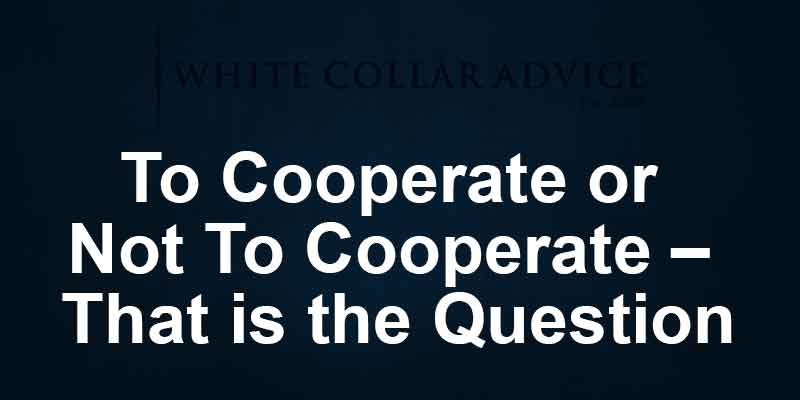TO COOPERATE OR NOT TO COOPERATE – THAT IS THE QUESTION
You are under investigation for a white collar crime, and are approached by Government agents or prosecutors and asked to cooperate. They may want you to meet with them and have you provide information about criminal activities in which you participated or of which you have knowledge; provide them with relevant documents; or even wear a wire or tape a phone call. What should you do? What are the benefits and risks of cooperating?
Hire an Experienced White Collar Defense Attorney
The decision on whether or not to cooperate is often a difficult one, and you should retain an experienced white collar criminal defense lawyer to navigate you through these treacherous waters. Not having the right person to advise and counsel you could have serious consequences for you. But also remember that your lawyer can only help you, and give you proper legal advice, if you’re completely truthful and honest with him or her.
Beware! Failing to be Truthful to the Government Could Result in a One-Way Ticket to Jail
If you are going to cooperate, and no one has to cooperate, the most important thing you must do is be completely honest and truthful with the Government. This isn’t a secret. From the beginning, Government agents and prosecutors will tell you that you must be completely truthful and not hold anything back, or you can be prosecuted for certain crimes. And any “proffer agreement” or cooperation agreement you sign with the Government will confirm this.
What can you be charged with if you either lie to or hold back information from the Government? The federal crimes you could be facing include lying to a Government agent (18 U.S.C. §1001); obstruction of justice (18 U.S.C. §1505); impeding an investigation (18 U.S.C. § 1512); and, if you’re under oath, perjury (18 U.S.C. §§1621 or 1623). If you’re talking to state prosecutors, the crimes are usually similar.
The issue of being truthful may seem like an easy call. Why lie to the Government? But it’s often not so simple. You may be embarrassed by or ashamed of what you did. You may feel the need to protect a close friend or relative. You may think that if you aren’t completely forthcoming, the Government will never find out. Don’t be fooled. If you are going to cooperate, you must go all in, be truthful, and not withhold any information. If you can’t do that, then simply don’t cooperate. Because if you do lie or hold back, then chances are you’re going to get yourself into real trouble because prosecutors and agents have been through this exercise many times before, and can usually tell when someone is lying or holding back. In the end, if you can’t be truthful and forthcoming, simply call off the interview, or even stop it before it’s completed.
If You Cooperate, and Do It the Right Way, You Can Benefit Significantly
If you cooperate, and do it the right way, you may receive substantial benefits.
First, the Government will almost certainly agree to reduced charges against you. Instead of being charged with three or four counts, the Government may only require you to plead guilty to one count. And if you self-report criminal activity unknown to the Government, or you’re the first one in to cooperate, or you provide extremely useful information that results in guilty pleas by or guilty verdicts against others, the Government might even agree not to charge you with a crime. Don’t count on it, but it’s possible.
Second, in a federal case, courts are required to take into account the Federal Sentencing Guidelines when determining your sentence. But if federal prosecutors deem your cooperation to be of substantial assistance to their case, they will file what is known as a “5K” motion asking the judge to sentence you to a term of imprisonment well below the Guidelines range. In fact, depending upon the circumstances of your case, you might even get probation – no jail time at all.
Finally, yet another advantage to cooperating is that the Government may reduce your financial penalties, which can include forfeiture, restitution and fines.
Take Aways
The decision as to whether or not to cooperate is an important, and often difficult one. While cooperation can certainly be very beneficial to an individual being investigated for white collar crimes, cooperation can only work if the person makes a careful and deliberate decision to go “all in” and cooperate fully and completely. And hire an experienced white collar defense attorney to help you along the way.
How to Approach Meetings with Government Officials
Below is a summary of our weekly webinar on July 8th, 2024. Joseph's Case Timeline:We created a detailed timeline of Joseph D. Gregorio's case, showcasing...
Pharmacist Nearly Returns To Federal Prison Camp
https://youtube.com/shorts/U3K8uwGDCHk "My probation officer and judge sent me back to the halfway house for six months and added three years of supervision because I bought a damn cup of coffee. These people are out to ruin your lives. You are never free," my bunkie...
Defying the Court: A Doctor’s Reckless Decision After Federal Prison
Many individuals believe they can close that chapter of their lives after being released from federal prison. They envision a total return to normalcy. I know from experience that the reality is often different. I know from experience that victims still awaiting...
Why a Release Plan Can Help You Prepare For The Halfway House and Home Confinement
For most people in federal prison, the transition home occurs in gradual stages, starting with time in a halfway house (aka Residential Reentry Center) and then transitioning to home confinement. Creating a robust release plan (assuming you want more liberty) is...
Keys To Successful Incarceration With Pre-Trial Services
In federal prison, hardly a moment passes without some prisoner blaming their judge, their lawyer, or the defendant who cooperated against them—anyone but themselves. If I hadn't found mentors, I think I might have been on the same track.Blaming others precludes us...
Preparing for Tomorrow: Why You Need a Release Plan Now
Looking for a shorter prison sentence or an early release? Click here to learn the importance of a release plan, a key piece of sentencing mitigation.


